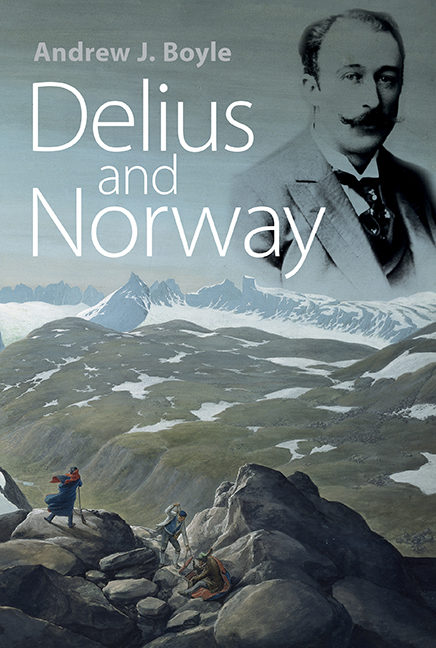Book contents
- Frontmatter
- Dedication
- Contents
- List of illustrations and tables
- Preface
- Abbreviations
- Selected glossary of landscape terms used in place names
- 1 Norway's awakening
- 2 1862–1888: Bradford, Florida and Leipzig
- 3 1888–1889: With Grieg on the heights
- 4 1890–1891: ‘C'est de la Norderie’
- 5 1892–1895: Norway lost
- 6 1896: Norway regained
- 7 1897: Front page news
- 8 1898–1902: Unshakeable self-belief
- 9 1903–1907: Breakthrough in Germany and England
- 10 1908–1912: Changes of direction
- 11 1912–1918: High hills, dark forests
- 12 1919–1934: Myth and reality in Lesjaskog
- Appendix I List of visits to Norway
- Appendix II Works with Norwegian and Danish texts and associations
- Selected bibliography and archival sources
- Index
8 - 1898–1902: Unshakeable self-belief
Published online by Cambridge University Press: 30 August 2017
- Frontmatter
- Dedication
- Contents
- List of illustrations and tables
- Preface
- Abbreviations
- Selected glossary of landscape terms used in place names
- 1 Norway's awakening
- 2 1862–1888: Bradford, Florida and Leipzig
- 3 1888–1889: With Grieg on the heights
- 4 1890–1891: ‘C'est de la Norderie’
- 5 1892–1895: Norway lost
- 6 1896: Norway regained
- 7 1897: Front page news
- 8 1898–1902: Unshakeable self-belief
- 9 1903–1907: Breakthrough in Germany and England
- 10 1908–1912: Changes of direction
- 11 1912–1918: High hills, dark forests
- 12 1919–1934: Myth and reality in Lesjaskog
- Appendix I List of visits to Norway
- Appendix II Works with Norwegian and Danish texts and associations
- Selected bibliography and archival sources
- Index
Summary
‘Snow-mountains in the distance’
Stage direction in A Village Romeo and JulietIn the year following Folkeraadet, Delius's career stagnated. He nurtured a dream of finding the key that would open the musical life of London, in particular an opera house that would stage Koanga. For the time being he lacked the resources that a prolonged promotional campaign in London would cost him. A new opera project based on the short story ‘Romeo und Julia auf dem Dorfe’ by Gottfried Keller had ground to a halt because Keary, his librettist for Koanga, could not work up any enthusiasm for it. In a period with little direction or continuity in his career, and still encouraged by the publicity Folkeraadet had brought to his name, it is unsurprising that Delius should have sought new theatre commissions.
In the spring of 1898, the book of Helge Rode's new theatrical piece, Dansen gaar (The Dance Goes On), was published in Copenhagen. It was a study of the struggle for genuine love and art and of the obstacles placed by daily life in the way of these ideals. The drama is played out around the figure of Aage Volmer, a painter, and Klara, the daughter of an industrialist, who secretly get engaged, despite Klara's father having negotiated for her a union with a nouveau riche aristocrat. Volmer's speeches about love and art seem to float on a cloud of aestheticism, distanced from the world. Shortly after its publication, two of Helge Rode's closest friends found much in it that spoke directly to their sensibilities: Edvard Munch and Fritz Delius. Indeed, Rode had mirrored a metaphysical ideal that was a common denominator in the creative lives of all three friends – poet, painter and composer. Volmer tells Klara:
whole wide world, all the sounds and colours of love – then it would create a collective feeling, – it could open for us a life of greatness –
When Aage Volmer describes the work he intends to paint, he depicts love as a state of ecstasy binding the lovers both to nature and to death:
The Dance of Life. My painting shall be called The Dance of Life! There will be a couple dressed in flowing clothes dancing one light summer night down an avenue of dark cypresses and red rose bushes.
- Type
- Chapter
- Information
- Delius and Norway , pp. 170 - 196Publisher: Boydell & BrewerPrint publication year: 2017



